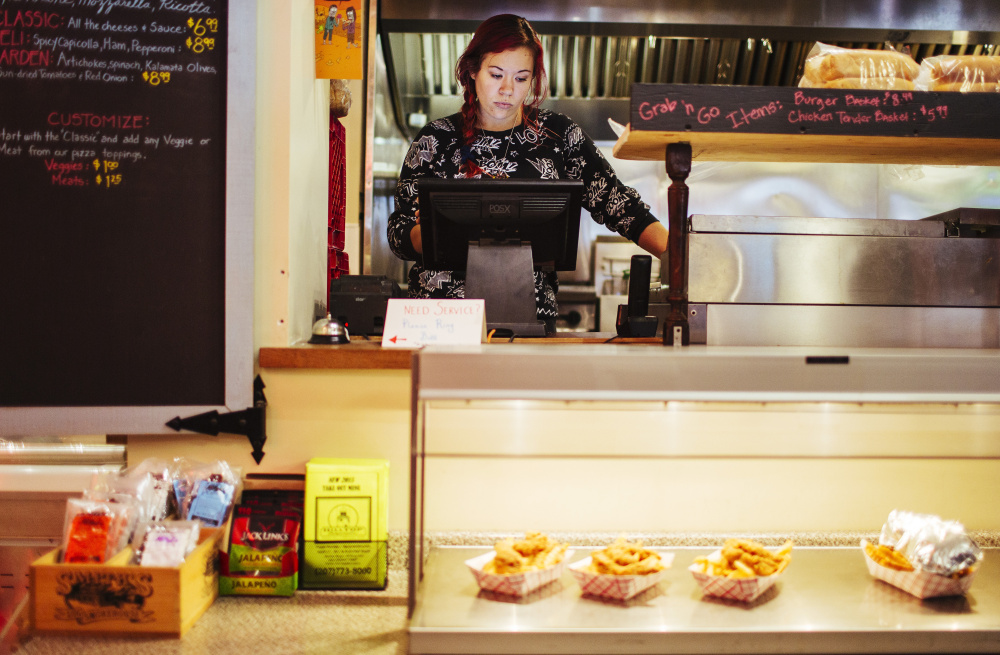There is a post-election analyis that declares Tuesday a very good day for conservatives.
The election of a tea party governor in Kentucky and the defeat of an equal rights ordinance in Houston are packaged together with a handful of other stray results from a number of states including Maine as proof of a national rejection of liberal values, presaging trouble for Democrats in 2016.
That conclusion may or may not prove true next year, but you should be extremely skeptical of any conservatism-is-on-the-march argument that cites the defeat of a $15 minimum wage referendum in Portland as a sign of progressive political decline.
At least as far as Portland is concerned, it is nonsense.
Viewing Portland election results through a right-versus-left prism rarely works because there is virtually no right in Maine’s biggest city. Business interests, which are often aligned with conservative interests, do play a role in the local elections through campaign contributions, but when residents go to the polls, elections tend to be squabbles between branches of the left-wing family.
Democrats hold almost all of the municipal and legislative elective offices, and their opposition party is the Greens, not the Republicans. Paul LePage may have been re-elected statewide last year, but he was trounced in Portland, losing by a 14,111-vote margin. In 2012, Barack Obama took the state with the help of a 20,000-vote plurality over Mitt Romney in the Forest City.
CITY STILL PROGRESSIVE
Unless tens of thousands of Portland residents plan to move before next Nov. 8, Maine’s most populous city will remain a reliable source of votes for progressive candidates and causes, no matter what happened this Election Day.
And it would be a serious error of judgment to read Tuesday’s results as a lack of enthusiasm in Portland for increasing the minimum wage, which would, in turn, spell trouble for the statewide referendum — likely to appear on next November’s ballot — to raise Maine’s minimum wage to $12.
Just because Portland voters did not back a $15-an-hour minimum wage this year doesn’t mean that they don’t back an increase in the minimum wage. The election here was decided on factors that were unique to the question on the ballot.
First, Portland’s City Council had just passed a citywide minimum-wage increase from the current statewide $7.50 an hour to $10.10 for most workers. When it goes into effect Jan. 1, Portland will have the seventh highest minimum wage in the nation. Portland voters were not rejecting a minimum-wage increase — they were selecting a more moderate one.
Second, there were legitimate concerns raised about how Portland would be isolated by moving to $15 so quickly. A minimum wage in one municipality that’s twice the minimum wage in all of its neighbors would put small businesses in Portland at a competitive disadvantage. Since many more people work in Portland than live here, the economic benefits of having workers with more money to spend would not stay in the local economy.
Third, the proposed $15-an-hour wage is the rallying cry of a national movement, not a solution based on an analysis of local conditions. It was created by fast food workers in big cities where incomes are generally higher than they are in Maine. Moving from $7.50 to $15 in two to four years, depending on the size of the employer, would radically disrupt the local economy in ways in which no one could predict.
There were other problems. The proposed citywide ordinance had no enforcement mechanism, and it involved legally questionable calculations that treat franchise businesses as large employers.
A RELUCTANT ‘NO’
Those reasons were enough for even sympathetic liberal voters to reluctantly say “no” to the $15 referendum.
But there is no reason to believe that the same would be true for the statewide $12 minimum wage on the 2016 ballot.
That would bump Maine’s minimum wage to $9 an hour in 2017, increasing it $1 a year until 2020 and following inflation after that. As a statewide measure, Portland businesses wouldn’t have to suffer the same disadvantage. The referendum’s pace of increase would be slow enough to allow businesses to budget. And the potential higher prices and job reductions would be balanced out by bigger paychecks and increased economic activity statewide.
A poll of Portland residents conducted last summer by the Maine People’s Resource Center found 75 percent support for the $12 statewide minimum wage, which is about the same share of the Portland vote that Michaud got in his race for governor last year and Obama got in 2012.
That doesn’t mean that the referendum will pass next year, but it does make a strong case that the 2015 local election results in Portland should not give conservatives any dreams of an easy road ahead.
Send questions/comments to the editors.



